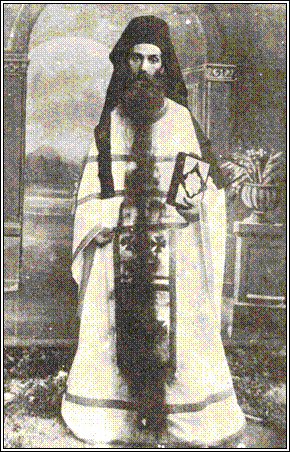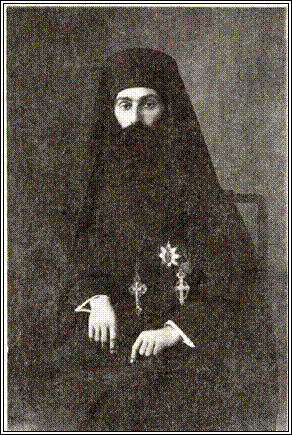The Elder Joachim (Nikolaidis) of Agia Anna


(Kalamata, 1895 – Agia Anna, Mount Athos, September 1950)
A blessed vessel of the Lord’s grace in the 20th century, Joachim maintained a lifelong love for Christ-centered asceticism and prayer.
LIFE AND WORKS
A. Birth and Upbringing:
Joachim, born Ioannis Nikolaidis, entered the world in Kalamata in 1895, to devout parents. He completed primary and secondary school in his hometown. As a thoughtful and lively teenager, he sought to know God, leading him to meet Elias Panagoulakis, a strict ascetic who lived in a cave near Kalamata. Around Elias, a spiritual movement grew, not based on fiery sermons or conversations—he was uneducated—but on his life itself. It was in this environment that the foundation of Ioannis’s spiritual life was laid.
B. Journey to America:
After finishing high school, he left for studies in America, a world that promoted the “American Dream” of prosperity, wealth, and ease. However, the young student had already learned not to bow to “foreign gods.” His main focus was spiritual cultivation and study, and he excelled in everything he undertook. During this period, he also gained practical experience as a preacher, serving the spiritual needs of the Metochion of the Holy Sepulchre, where Bishop Panteleimon was the Exarch.
Many parishes, with the Bishop’s blessing, invited him to preach from the pulpit. Consequently, the Bishop asked him about his future plans, to which Ioannis revealed his hesitation to pursue priesthood due to a sense of unworthiness. He believed that one should only answer a divine call with fear, as his spiritual teacher in Kalamata had taught him.
The devout Bishop, impressed by Ioannis’s spiritual depth, encouraged him to serve the Lord. Ioannis responded with humble obedience. Although the Bishop hoped Ioannis would visit him, Ioannis was reluctant. Eventually, he gathered the courage and asked the Bishop, “If the Holy Spirit compels you, then I will obey. A clergyman must either be called by God or by the people.” The Bishop informed him that he would be ordained as a deacon the following Sunday.
C. Monk, Deacon, Priest:
Thus, Bishop Panteleimon became the one to open Ioannis’s path to the priesthood. After announcing his ordination, the Bishop blessed him, and the following Sunday, the church was filled with Greek-Americans. The resounding “axios” (“worthy”) was heard both for his tonsure as a monk, with the name Joachim, and for his subsequent ordination as a priest.
The entire Greek community was soon illuminated by Father Joachim’s profound and theological sermons. His deep love and respect for Orthodoxy were evident. His influence extended even to Americans of other denominations, who began engaging with him and learning about Orthodox theology. In recognition of his work, the Patriarchate of Jerusalem awarded him the Holy Sepulchre Medal.
People were especially struck by his appearance, with his large black beard, a characteristic image of an Orthodox clergyman. It’s said that people once stopped him in the street, and the crowd grew so large that even the police couldn’t disperse them!
Over time, however, his health began to falter. It is said that he had to receive tonics before every sermon or service to be able to stand upright.
D. Return to Greece:
In 1930, at 35, while continuing his spiritual work, the Church in America transformed into the “Archdiocese of America,” with new administrative changes. Up until that time, the Greeks of America were served by the Patriarchate of Jerusalem (which was very traditional then) and served according to the Old Calendar. In 1930, a special committee led by Metropolitan Damaskinos of Corinth took over, and Bishop Panteleimon, Exarch of the Holy Sepulchre, returned to the Patriarchate of Jerusalem.
With the departing Bishop’s blessing, Father Joachim left America for Greece, eventually traveling to Mount Athos.
E. At Mount Athos:
His vision of the austere life in the ascetic wilderness of Mount Athos grew stronger. Despite obstacles due to his weak health, American education, and refined upbringing, he chose the remote Kavsokalyvia. Inspired by the lives of saints like Maximos, Nilos the Myrrh-Gusher, Niphon, and Akakios, he joined a blessed brotherhood, living as a disciple.
F. The Assembly of the Zealot Fathers
Hieromonk Joachim chose and belonged to the assembly of the zealot fathers of Mount Athos. The Zealot Fathers of Mount Athos were a group of monks active in the 20th century, beginning around 1924, who stood firmly for traditional Orthodox beliefs and practices. In response to the adoption of the New Calendar by the Patriarchate of Constantinople and the Church of Greece, these monks did not commemorate the heretical Patriarch of Constantinople but rather aligned themselves with the True Orthodox Christians of Greece. Their commitment to preserving the ancient customs of Orthodoxy often put them at odds with mainstream ecclesiastical authorities, yet they maintained communion with other communities that shared their dedication to upholding traditional Orthodox faith and practices.
He chose a simple life and embraced the challenging ascetic lifestyle of Athos, wearing humble robes and following strict fasting practices.
G. Excerpts from His Life:
The Cross of Obedience: As a disciple, every night he confessed his thoughts to his elder, saying, “A monk who does not confess his thoughts daily will not learn the art of fighting and winning.” Even when exhausted, he never left tasks incomplete out of obedience.
2). His True Prayer: All day long, Fr. Joachim prayed with the unceasing heart prayer. He often said, “If you take prayer away from a monk, you take away his right to feel like a true child of God.” When visiting us during our duties, he would frequently ask if we were saying the “prayer” or the salutations to the Theotokos. He rarely engaged in conversation, and only when necessary, so as not to lose time from prayer! Indeed, he regarded food and rest as… unnecessary for the sake of prayer!
During the night, the monks in his company would often hear his lamentations, but at Matins, he appeared fresh and joyful. However, his body often couldn’t keep up with his spirit’s flights. Due to the all-night vigils and constant standing, he developed ulcers on his legs from poor circulation, forcing the elder to forbid him from staying overnight in… the church! Yet, the good lad “knew another path.”
So, in his cell, he set up a haircloth rough mat, wrapped himself in a heavy garment, without a pillow, and continued his spiritual struggle. And when his eyes would close on their own, his lips would continue the prayer: “Lord Jesus Christ, Son of God, have mercy on me.” It is said that the most powerful prayer that moved him was the “Holy Trinity” and any other Trinitarian prayer!
He held a special love for the Theotokos. He often advised, “Hold fast to the robe of the Theotokos in your life, and she will surely lead you to her Son.” At other times, he would say, “The meanings of the hymns and prayers in the services are like a beautiful meadow, and whoever manages to enter it finds it hard to leave. And upon leaving, he will carry its fragrance throughout the day.”
The order in the hut, established through his own initiative, was characteristic. It was an outcome of the Kollyvades tradition. He was also very polite and showed boundless love to guests. He would say, “If a brother from outside joins our service, we should give him the best position, even at the chant stand, to chant. And if he makes a mistake in the tone of the day, you who are on the left choir should not correct him or embarrass him; let him realize it on his own. Love, honor, and respect are more important than the tone!”
4). Love for the Beard: Since his time in America, he was distressed by the modernist spirit that began infiltrating church matters. Fr. Joachim resisted this as much as he could. He could not understand a clergyman or monk abandoning his cassock or cutting his hair or beard. Before being ordained, he prayed to the Theotokos, saying, “Mother of God, I want when I become a clergyman for you to give me a beard and abundant hair, so I can be like the clergymen of my homeland.”
When he came to Mount Athos, his beard grew so long that it reached his feet, a rare occurrence in the history of the Fathers. But for the sake of mobility and humility among the other monks, he would put it in a… little bag hung around his neck. Towards the end of his life, the fathers asked him to be photographed with his priestly vestments and beard. At first, he refused, but eventually relented out of love for their insistence.
H). Sickness and Confession:
In his later years, he became physically weak to the point that he required a doctor. In contrast, sanctity filled his spirit and, when needed, his body as well. Against his wishes, the elder called a doctor to the hut. The diagnosis was disappointing: his death was only a matter of months, and the doctor prescribed complete rest and a normal diet, including meat, eggs, and cheese. After the doctor left, he begged the elder to let him spend the whole night in the church and discuss his health in the morning. The elder, sensing something, gave him his blessing. Fr. Joachim prayed all night to the Theotokos and, in the morning, asked the elder not to change his diet, so that the Theotokos might… be glorified!
The tireless disciple asked to take only a little food each afternoon and to eat standing. A year and a half later, the doctor visited and asked if the monk was still alive. When he saw him and examined him, he found no trace of illness, and so… the Theotokos was glorified.
At one point, he was deeply shaken by the realization that many prominent figures of the society of his time were members of the lodge, i.e., Masons, while wanting to also call themselves Orthodox… He rebuked them publicly, even standing trial in Thessaloniki. He was convicted and exiled to Skopelos for his confession! There, his kindness, prayer, and fasting deeply impacted the islanders. The parade of the German occupation forces found him in exile. Soon after, he returned to his solitary life.
I). His End:
Returning, Elder Joachim, instead of finding peace, encountered something that wounded his heart deeply. A brother from his company who had gone into the world for work had become entangled in worldly bonds and ultimately fell! His unbearable pain drove him to search for him. He found him, but all his efforts were in vain. After this, he returned with a clear conscience, though the blow he received was severe, and his body could no longer keep up with his spirit.
His elder had, in the meantime, passed away, and so he stayed with Fr. Stephen, who had come with him from abroad. Fr. Stephen stood by him with boundless devotion. He departed to the Lord.
He was buried behind the altar of the hut, where he had practiced asceticism. The brothers and fathers were certain that he had “passed from death into life.”





